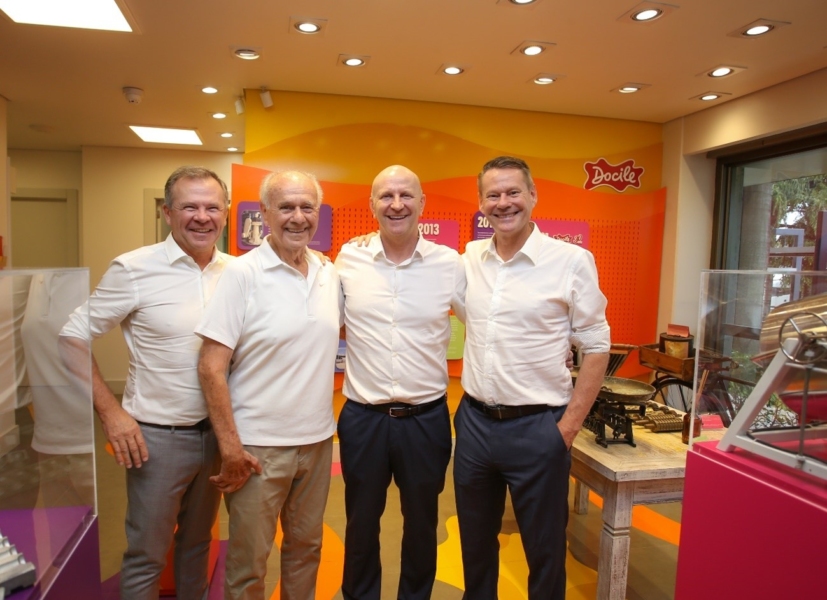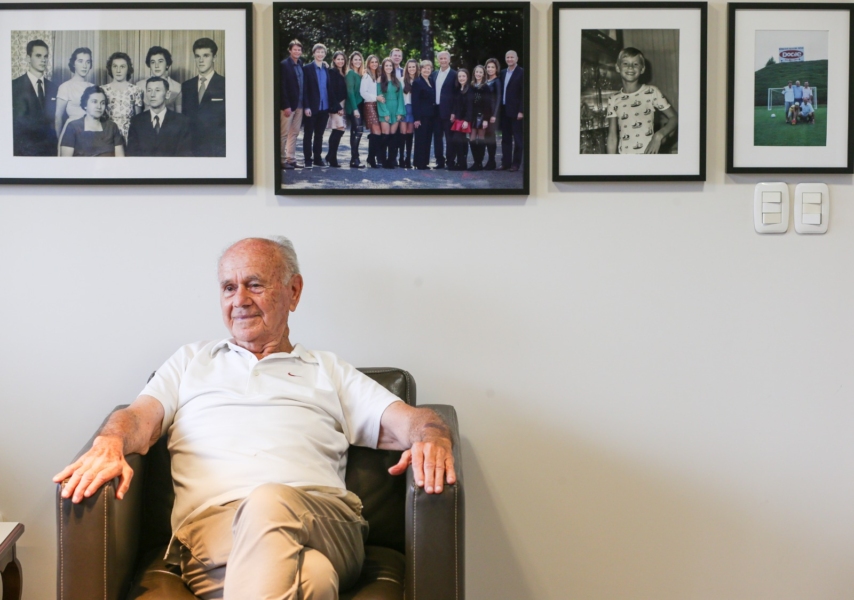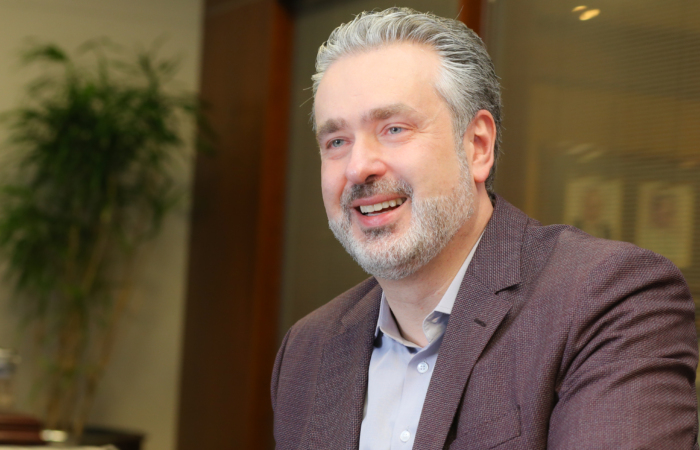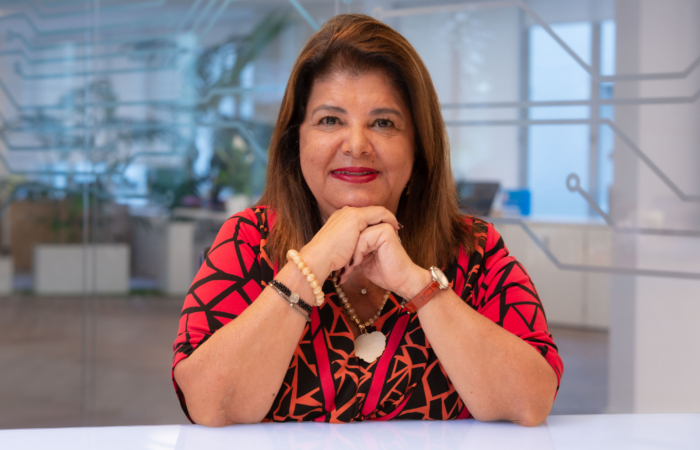
The managing partners of Docile Ricardo, Fernando and Alexandre Heineck talk about their trajectory, their achievements and challenges, their business values and how they work for the reputation of the brand and the legacy of the sweets company they founded in Lajeado (RS) and today is the largest Brazilian exporter in the segment.
In a few days, when the world will be facing the Pair Olympic Gamesis, the Rio Grande do Sul company Docile will have a special place in the 'dispute'. The sweets and sweets manufacturer is a partner of Team Brasil, that is, the official sweet brand for Brazilian athletes in France. With the partnership closed with the Brazilian Olympic Committee (COB), in addition to increasing its visibility, enhancing markets here and abroad and strengthening its connection with young consumers, the company propagates the values that contribute to its reputation.
Just like the principles of Olympism – friendship, equality, mutual understanding, solidarity and fair play – the company's purpose and values are closely related to kindness, respect, simplicity, collaboration and dedication to creatively create as well as possible.
The initiative is another step in the brand's strategy, which has teamed up with partners who share a reputation inspired by similar values. Therefore, since 2022, since 2022, its official ambassador has been skateboarder Rayssa Leal, silver in Tokyo 2020. It couldn't be a happier choice. She is one of the biggest promises for Paris and owns the hearts of the Brazilian fans. This year, they joined the skateboarding beast for the brand's campaigns Rebeca Andrade, from artistic gymnastics, Ary Borges, from football, and Darlan Romani, from shot put, as well as influencers who speak the same language as Docile's customers.
From raw material distributor to industry with revenue of R$ 750 million
Among the main manufacturers in the sector in Brazil and the largest Brazilian exporter of sweets, Docile preserves, with its cheerful, young and innovative image, the same pioneering spirit of the company that was born almost 35 years ago, in Lajeado, a medium-sized municipality, around 100 kilometers from Porto Alegre. At that time, during the disastrous Collor Plan and persistent hyperinflation, not even the unfavorable economic scenario diminished the entrepreneurial appetite of its three founders.
Ricardo, Fernando and Alexandre Heineck have the resilience and sparkle in the eyes of those who want to make it work and a special ingredient: they are descendants of men and women with a vocation for the craft of producing sweets.
The three started with a distributor of raw materials for the food industry, initially investing around R$ 200 thousand, at current prices. Today, they run the family company, which has 1,700 employees and estimated revenue of R$ 750 million for 2024.
“We always sought differentiation in everything we did. Doing it well is one of our first principles and strategy.”
Ricardo Heineck

At the beginning, Alexandre, the youngest, then 23 years old, and Fernando, 26, were on the front line. Ricardo, 29 years old, was a partner in the partnership, but still worked with Nestor, his father, in the manufacturing industry. Florestal candies, also from Lajeado, a company that originated in the garage of his grandfather, Natalício Heineck, artisan confectioner and born entrepreneur. Nestor inherited Natalício's vocation and inspired his children to literally get their hands dirty, launching their own business and building much more than a fantastic candy factory.
A lot of history and dedicated work went into this report, written by the four of them, Nestor, Ricardo, Fernando and Alexandre at the same time. Reputation Feed, during a visit to Docile’s headquarters.
From the distributor, a few years later they started producing powdered drinks and, later, gummies and lozenges. In the beginning everything was very rudimentary. They even needed to adapt equipment to produce.
“We went from the concrete mixer, today in front of the company, to the best equipment in the world inside our factory”, says Alexandre, comparing the period in which they used a concrete mixer to mix ingredients to the current moment.

The utensil now rests as a museum piece and a reminder of how it all began, in front of Docile's administrative building, while its factories combine modern automation, with robotics, and professional training.
Currently, the line includes more than 180 products, including regaliz (straws), chewing gum, jelly candies and marshmallows, produced in Lajeado and at the Vitória de Santo Antão (PE) manufacturing unit. “We are very proud of the products we produce. We have a factory that is a fortress, since 2008, with only first-rate equipment. And also great engagement, thanks to our organizational climate”, summarizes Fernando. There are more than 4 million kilos of treats per month, which corresponds to more than 200 thousand kilos per day. What does that mean? No less than eight trailer loads of sweets, weighing 25 thousand kilos.


Research, certifications, quality and reputation
Much of what comes out of Docile's production lines was developed with a lot of research directly on the market. One of their recurring practices is to attend the main international fairs in the segment, where they also seek insights. They travel the world. Alexandre negotiates each export order and seeks to meet the requirements of foreign customers. Ricardo, who is extremely focused on quality and innovation, seeks inspiration for product launches. And Fernando goes through the exhibitions to update himself on the most modern technology and production machinery.
“We are proud of the products we produce. We have a factory that is a fortress, since 2008, with only first-rate equipment. And also great engagement, thanks to our organizational climate.”
Fernando Heineck
Reputation was earned over time. “We were improving our portfolio, product quality and seeking certifications with global relevance, endorsing Docile as a reliable supplier, validating us in terms of quality”, explains Alexandre. Therefore, the company highly values the certifications obtained, such as the international FSSC22000, for food safety. Today, Docile exports to more than 80 countries.
The company also seeks to increase its visibility in the national market. One of its strategies is the expansion of the brand through points of sale – in addition to actions such as the partnership with the Brazil team in the Olympic Games, support that also extends to the Paralympic athletics team Naurú, a high-performance sports project created by athlete Verônica Hipólito. Docile already has kiosks in Lajeado and at Congonhas airport (SP) and, more recently, installed a unit in Hopi Hari park, in Vinhedo (SP). These last two, in addition to being located in busy areas, strengthen the brand's presence in the country's largest consumer market. ”We always seek differentiation in everything we do, in the products, with texture, flavor, packaging. Doing it well is one of our first principles and strategy”, emphasizes Ricardo.


Governance and succession
14 years ago, the company and its partners began to adopt a series of governance practices, such as shareholder agreements, clarity of roles in society and executives, installation of a Board of Directors and budgetary culture. “Docile is above our private interests”, says Ricardo.
The three partners hold executive positions in the company, but have been forming the executive board with professionals from within Docile itself and also from the market. “We try to be very close to people, investing in them and encouraging participation in the business”, says Fernando. For Ricardo, a family business, professionally managed, can be much more efficient than an organization managed only by market executives. “There is a greater vision of longevity, and dedication is perhaps one of the strengths of the family business”, he reinforces.
The second generation is also showing interest and is being prepared to work in the company. In total, there are six descendants, all of whom are students or have already graduated in Production Engineering: Laura and Júlia, Ricardo's daughters; Tainá and Felipe, by Fernando; and Marina and Gabriela, by Alexandre. Furthermore, they are developing professionally to become partners, including support from an executive who worked in family offices of traditional business families in Brazil, the parents say.
“The arrival of children could make the business even better. I have the belief, a very high dose of confidence, that the entry of a new generation can do even better than us.”
Alexandre Heineck
Of Nestor's six grandchildren, Thainá and Laura already work at Docile. They had someone to pull. Asking what he feels when he sees his descendants joining Docile, Nestor responds: “I feel a lot of joy. I see my grandchildren with a lot of interest in the company. And they receive guidance. If they don't want to work here, they don't have to, but they should be good partners. I always told them that. Usually, companies that do badly after changing generations are because they weren’t prepared for it.”
It's supposed to leave your heart feeling warm, like a marshmallow fresh out of the machine.

Christianne Schmitt is editor of the Reputation Feed
Christianne.schmitt@ankreputation.com.br



